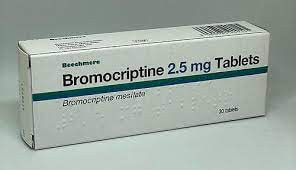|
Pharmacology - Bromocriptine
Bromocriptine is an anti-parkinsonian medication. Inhibits the pituitary gland's ability to secrete prolactin. Method of Operation It is possible to counteract the reduction of dopaminergic transmission by activating D2 receptors on striatal neurones. It is possible that actions on D1 receptors have a significant role in alleviating the symptoms of the condition that are not related with Parkinson's disease. The half-life of dopamine agonists is longer than that of levodopa, and thus offer a more constant response to the symptoms they treat. Two hours for bromocriptine, twelve hours for pramipexole, and six hours for ropinirole. Use in Clinical Settings Applied on their own or as adjuvants to levodopa treatment in Parkinson's disease. In the early phases, before the administration of levodopa, it is frequently utilized. The effect that bromocriptine has on the secretion of prolactin is utilized in the treatment of amenorrhea and acromegaly. Effects That Are Bad Enhanced hallucinations and drowsiness (in comparison to levodopa symptoms). Postural hypotension is caused by. The risk of dyskinesias is lower than it is with levodopa. It is extremely uncommon for bromocriptine and other ergot derivatives to elicit fibrotic responses.
0 Comments
Leave a Reply. |
Kembara XtraFacts about medicine and its subtopic such as anatomy, physiology, biochemistry, pharmacology, medicine, pediatrics, psychiatry, obstetrics and gynecology and surgery. Categories
All
|


 RSS Feed
RSS Feed
